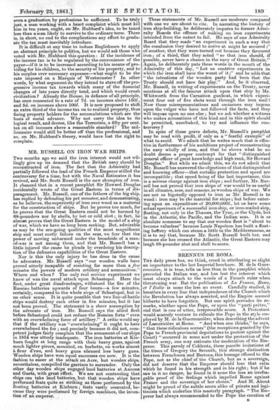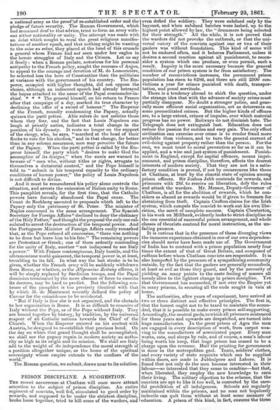BR.ENNUS DE ROMA.
Trim daily press has, we think, erred in attributing so slight an importance to the last Imperial brochure. M. de la Guer- ronniere, it is true, tells us less than in the pamphlet which preceded the Italian war, and has lost the interest which must always attach to the words of a French ruler when threatening war. But the publication of La France, Rome, et l'Italie is none the less an event. Carefully studied, it breathes in every line that independence of the Church which the Revolution has always asserted, and the Empire seemed hitherto to have forgotten. But one spirit pervades its re- marks, whether upon the Pope, or upon the " parti pretre," and that is one of utter, irrepressible scorn. A Protestant would scarcely venture to ridicule the Pope in the style em- ployed by M. de la Guerronniere, when describing the advent of Lamoriciere at Rome. "And when one thinks," he says, "that these ridiculous scenes" (the receptions granted by the Pope to French provincial deputations to protest against the Court) "occurred in some sort under the protection of the French army, one may estimate the moderation of the Em- peror. This parody of Coblentz, these puerile imitations of the times of Gregory the Seventh, this strange distinction between Frenchmen and Bretons, this homage offered to the Pope, not as the chief of the Church, but as a sovereign, did not deserve that the Emperor should lose that calm which he found in his strength and in his right; but if he saw in it no danger, he found in it none the less an irrefra- gable proof of the feelings which impelled Rome against France and the sovereign of her choice." And M. About might be proud of the subtle scorn alike of priests and legi- tinusts which underlies this masterly paragraph. "The Em- peror had always recommended to the Pope the creation of a national army as the proof of re-established order and the pledge of future security. The Roman Government, which had remained deaf to that advice, tried to form an army with- out either nationality or unity. The attempt was made with an eclat which sought to recal the great religious manifes- tations of another epoch, and that nothing might be wanting to the min en sane, they placed at the head of this crusade a general whom France had not seen under her eagles in the heroic struggles of Italy and the Crimea. Let us say it freely: when a Roman prelate, notorious for his personal antipathy to the French policy, sought the recesses of Anjou, to appeal to the courage and devotion of M. de Lamoriciere, he selected less the hero of Constantine than the politician at variance with the government of his country. The Em- peror, occupied with higher thoughts, did not oppose the choice, although an indiscreet speech had already betrayed the hopes attached to the name of the Papal commander-in- Chief. * * a The general himself, on his return to France after that campaign of a day, marked its true character by declining the offer of a sword of honour." The Emperor of the French, roundly condemning the Papacy, actually quizzes the parti pretre. Able rulers do not satirize those whom they fear, and the fact that Louis Napoleon can laugh at priestly antics, indicates a total change in the position of his dynasty. It rests no longer on the support of the clergy, who, he says, "marched at the head of their flocks to vote for his election," and in that change, far better than in any solemn assurance' men may perceive the future of the Papacy. When the plirti pretre is called by the Em- peror himself, the party which "desires to make God the accomplice of its designs," when the cures are warned to beware of "men who, without titles or rights, arrogate to themselves a dictatorial control," and the Pope himself is told to "submit in his temporal capacity to the ordinary conditions of human power," the policy of Louis Napoleon is not difficult to divine.
And it must be remembered his policy alone controls the situation, and arrests the extension of Italian unity to Rome. This pamphlet reveals, for the first time, that the Catholic powers have formally abandoned the Papal cause. The Count de Hochberg assented to proposals which left to the Papacy only the patrimony of 8t. Peter. The minister of Naples concurred in the same arrangement. The Spanish Secretary for Foreign Affairs" declined to deny the obstinacy of the HolyFather, ' and thought the proposal the only one cal= culated to arrest the destruction of the temporal power. And the Portuguese Minister of Foreign Affairs coolly remarked that, as the Pope refused all concession, "there was nothing to be done but leave him to his fate." The remaining powers are Protestant or Greek; one of them ardently contending for the unity of Italy, another "not indisposed to see Italy a power." With France contemptuous, Italy hostile, and the ultramontane world quiescent, the temporal power is, at least, trembling to its fall. In what way the last stroke is to be given whether the French army will be suddenly withdrawn from given, or whether, as the Allgemeine Zeitung affirms, it will be simply replaced by Sardinian troops, and the Papal dominion terminated by the mere absence of force to execute its decrees, may be hard to predict. But the following sen- tence of the pamphlet is too precisely identical with that by which M. de Manteucci recently defined the policy of Cavour for the coincidence to be accidental.
"But if Italy is free she is not organized, and the obstacle to her organization is Rome. It is as difficult to conceive of Italy without the Pope, as of the Pope without Italy. They are bound together by history, by tradition, by the universal respect of all Catholic nations towards the Chief of the Church. When the Emperor entered on his contest with Austria, he designed to re-establish that precious bond: On the day on which that grand thought shall be accomplished, we shall see the papacy regain in modern society an autho- rity- as high as its origin and its mission. We shall see Italy add to the weight of its independence the moral strength of a position altogether unique, as the home of the spiritual sovereignty whose empire extends to the confines of the world."
The Roman question, we submit, draws near to its solution.































 Previous page
Previous page